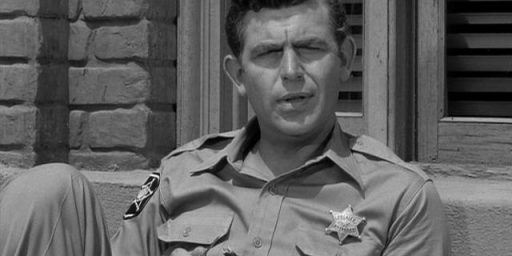Andy Rooney Dead at 92
Andy Rooney, best known to recent generations as the cranky old man at the end of "60 Minutes," has died at 92.
Andy Rooney, best known to recent generations as the cranky old man at the end of “60 Minutes,” has died at 92.
CBS (“Andy Rooney dead at 92“)
Andy Rooney, the “60 Minutes” commentator known to generations for his wry, humorous and contentious television essays – a unique genre he is credited with inventing – died today. He was 92 and had homes in New York City, Rensseleaerville, N.Y. and Rowayton, Conn.
Rooney had announced on Oct. 2, 2011 in his 1097th essay for “60 Minutes” that he would no longer appear regularly.
Rooney wrote for television since its birth, spending more than 60 years at CBS, 30 of them behind the camera as a writer and producer, first for entertainment and then news programming, before becoming a television personality – a role he said he was never comfortable in. He preferred to be known as a writer and was the author of best-selling books and a national newspaper column, in addition to his “60 Minutes” essays.
But it is his television role as the inquisitive and cranky commentator on “60 Minutes” that made him a cultural icon. For over 30 years, Rooney had the last word on the most watched television program in history. Ratings for the broadcast rose steadily over its time period, peeking at a few minutes before the end of the hour, precisely when he delivered his essays – which could generate thousands of response letters.
Each Sunday, Rooney delivered one of his “60 Minutes” essays from behind a desk that he, an expert woodworker, hewed himself. The topics ranged from the contents of that desk’s drawer to whether God existed. He often weighed in on major news topics. In an early “60 Minutes” essay that won him the third of his four Emmy Awards, his compromise to the grain embargo against the Soviet Union was to sell them cereal. “Are they going to take us seriously as an enemy if they think we eat Cap’n Crunch for breakfast?” deadpanned Rooney.
Mainly, his essays struck a cord in viewers by pointing out life’s unspoken truths or more often complaining about its subtle lies, earning him the “curmudgeon” status he wore like a uniform. “I obviously have a knack for getting on paper what a lot of people have thought and didn’t realize they thought,” Rooney told the Associated Press in 1998. In typical themes, Rooney questioned labels on packages, products that didn’t seem to work and why people didn’t talk in elevators.
Rooney asked thousands of questions in his essays over the years, none, however, began with “Did you ever…?” a phrase often associated with him. Comedian Joe Piscopo used it in a 1981 impersonation of him on “Saturday Night Live” and, from then on, it was erroneously linked to Rooney.
ABC (“Journalist Andy Rooney Dies at 92“):
Andy Rooney, the rumpled writer whose weekly riffs about the absurdities of everyday life made him one of television’s longest-running commentators, died Friday night, just weeks after his farewell broadcast on “60 Minutes.” He was 92.
He died from complications from a recent a recent surgery.
Rooney presented his first commentary on “60 Minutes” in 1978 and he became a weekly fixture the following year when he assumed his perch at the end of the broadcast.
It would be a remarkable run. By the end of Rooney’s final appearance Sunday, Oct. 2, he had presented 1,097 original essays and had worked for CBS for 62 years.
“One day about 10 years ago the door to my office opened and who walked in but Bill Gates. … Seemed like a nice guy and has done more with his money than most billionaires. But that’s as far as I want to go being kind to Bill Gates,” Rooney said in one of his classic essays.
“I had one typewriter for 50 years, but I have bought seven computers in six years. I suppose that’s why Bill Gates is rich, and Underwood is out of business.”
In a 2008 commentary, Rooney marveled at the flood of Christmas catalogues stuffing his mailbox. “This is a Sears catalogue. Sears, whatever happened to Roebuck? You never hear Sears, Roebuck anymore. Call if you’re out there, Roebuck,” he deadpanned.
In one of his final appearances, Rooney kvetched about changes in pop music. “If I am so ‘average American,’ how come that I have never heard of most of the musical groups that millions of others Americans apparently are listening to,” he said.
“The singers I know have been replaced by singers like Justin Bieber, Lady Gaga and Usher. I mean, who?
AP (“Former ’60 Minutes’ commentator Andy Rooney dies“):
Andy Rooney, the curmudgeonly commentator who spent more than 30 years wryly talking about the oddities of life for “60 Minutes,” died Friday night, CBS said. He was 92.
Just a month ago, Rooney delivered his last regular essay on the CBS newsmagazine.
CBS said he died Friday night in New York from complications from a recent surgery.
Rooney, also a syndicated newspaper columnist, talked about what was in the news. But he was just as likely to use his weekly television essay to discuss the old clothes in his closet, why banks need to have important-sounding names or whether there was a real Mrs. Smith who made Mrs. Smith’s Pies.
He won three Emmy Awards, including one for his story revealing there was no Mrs. Smith.
Rooney began his “60 Minutes” commentaries in 1978 and was still at it three decades later, railing about how unpleasant air travel had become. “Let’s make a statement to the airlines just to get their attention. We’ll pick a week next year and we’ll all agree not to go anywhere for seven days,” he told viewers.
“I obviously have a knack for getting on paper what a lot of people have thought and didn’t realize they thought,” Rooney once said. “And they say, ‘Hey, yeah!’ And they like that.”
In early 2009, as he was about to turn 90, he looked ahead to Barack Obama’s upcoming inauguration with a look at past inaugurations. He told viewers that Calvin Coolidge’s 1925 swearing-in was the first to be broadcast on radio, adding, “That may have been the most interesting thing Coolidge ever did.”
Rooney wrote for CBS stars such as Arthur Godfrey and Garry Moore during the 1950s and early 1960s, before settling into a partnership with newsman Harry Reasoner. With Rooney as the writer, they collaborated on several news specials, including an Emmy-winning report on misrepresentations of black Americans in movies and history books. He wrote “An Essay on Doors” in 1964, and continued with contemplations on bridges, chairs and women.
“The best work I ever did,” Rooney said. “But nobody knows I can do it or ever did it. Nobody knows that I’m a writer and producer. They think I’m this guy on television.”
Rooney angrily left CBS in 1970 when it refused to air his heated essay about the Vietnam War. He went on TV for the first time, reading the essay on PBS and winning a Writers Guild of America award for it.
He returned to CBS three years later as a writer and producer of specials. Notable among them was the 1975 “Mr. Rooney Goes to Washington,” whose lighthearted but serious look at government won him a Peabody Award for excellence in broadcasting.
“A Few Minutes With Andy Rooney” aired on “60 Minutes” for the first time on July 2, 1978. Rooney complained about people who keep track of how many people die in car accidents on holiday weekends. In fact, he said, the Fourth of July is “one of the safest weekends of the year to be going someplace.”
I haven’t watched “60 Minutes” with any regularity in years, although it was a staple of my Sunday night viewing for probably 25 years. Rooney’s segments were always something to look forward to.
Rooney joins a long list of men who retired at the top of their profession and died within weeks. Paul “Bear” Bryant and Steve Jobs come immediately to mind as examples, but it happens all too often.





